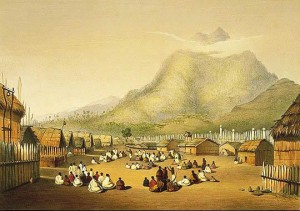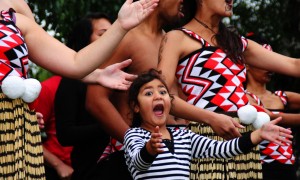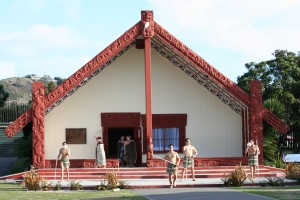The Beginner's Guide to the Māori Culture in New Zealand
Māori were the first human inhabitants of New Zealand, arriving from Polynesian pacific islands between 700–1,000 years ago. There are many original settlements all over the country and their rich and remarkable heritage stems from fascinating oral legends, a close connection with the land, intricate carving and weaving skills, and close-knit iwi/tribes.
Early Māori were experts at hunting, fishing, gathering and growing. They lived in small settlements or fortified Pā, and their strong, brave warriors regularly engaged in battle over land and iwi supremacy. An iwi or tribe was led by a rangatira (chief) who was a highly respected and revered. He or she would wear elaborate cloaks made from kiwi feathers or dog fur, while other iwi member’s garments included materials such as animal skins, flax and grasses, decorated by stone or bone jewellery.
We hope you have the opportunity to visit a Māori Pā/marae (meeting area) or take part in a Māori cultural experience during your time in New Zealand – you’ll learn a lot and have a great time doing it!

Māori values and beliefs
Māori place a high value on family ties and are proud of their heritage and iwi links. It’s not uncommon for grandparents, uncles, aunts, cousins and grandchildren to live within a family unit and the sharing of food, games and stories has always been a favourite tradition and past time. Skills such as carving and weaving that are hundreds of years old are passed down from generation to generation. Some people have tattoos (moko) representing their heritage or status – you’ll often see spiralling koru and intricate representations of mountains and rivers.
Oral legends also play a big part in Māori culture. Since the language only began to be written down by Europeans when they arrived, Māori legends, stories and messages were passed between families and iwis by song, dance or speech. They are continued to be spoken or performed today, with very little variation from the original versions.
Māori have a special connection with the land, rivers, mountains and oceans of New Zealand. Some of these areas are tapu (sacred/untouchable/spiritually or religiously protected) because of the belief that a spirit resides there or that it was the site of a historic event. Special customs are observed during ceremonies such as births, weddings and funerals to keep with traditional protocols.
Māori culture in the 21st century
It’s common to see Māori translations alongside English throughout New Zealand, and everyone is encouraged to take part in cultural celebrations in order to preserve the culture and educate people around the country and visitors from around the world. The Māori language (Te Reo) is one of the three official languages of New Zealand and is taught or offered in many schools. Cultural awareness and the language is taught through singing Māori songs (waiata), performing haka and taking part in Kapa Haka (performing arts) groups.

Arriving at a marae and taking part in a pōwhiri
The pōwhiri is a traditional welcoming ceremony when entering a marae. The pōwhiri is governed by rules and protocol, which can vary regionally. It is respectful to arrive early and dress modestly. While standing at the entrance, your hosts will send forth a high-ranking elder (usually a female) who will acknowledge your arrival with a karanga (oratory summons). You’ll have a guide that will reply in the same way while you walk forward in a group. The karanga is about identifying the group’s heritage or who they represent, as well as paying tribute to recently deceased family or iwi members.
The original purpose of a pōwhiri was to ensure a visiting iwi or tribe had friendly motives before they were welcomed onto the settlement. Sometimes a haka (Māori war dance) is performed as a ritual challenge where a baton is laid down by the hosts and picked up by the leader of the visitors.
Welcoming speeches are then given by members of both the hosts and visitors. Each group will sing a waiata (song) after each speech, and a koha (usually a monetary gift) is given to the hosts as a thank you for their hospitality. On conclusion, the hosts and visitors line up to hongi (press noses) and shake hands. Signalling the end of the pōwhiri, a light supper or meal is usually shared in another room.
Rules and protocol on the marae
Your hosts should outline the rules to be followed in the marae you are visiting, and some may have different rules to others. Here are some general rules that are the same everywhere:
- Remove your shoes before entering the wharenui (meeting house).
- Be respectful toward elders and hosts.
- Food or drink is only to be consumed in the wharekai (dining room). Elders and visitors always go first and generally a karakia (prayer or blessing) takes place before people begin eating.
- Do not pass food over someone’s head or sit on the table.
- If you are staying the night, mattresses are usually provided but you must bring your own pillows and blankets/sleeping bag.
- Just like the table, do not sit on pillows for sleeping or step over/in front of people who are speaking.
- Make sure your sleeping position is in the correct place – you may be asked to sleep on a particular side of the building or to leave places reserved for elders or leaders.

Experiencing the Māori culture in New Zealand is something not to be missed – the people are welcoming and friendly, and the celebrations, performances and pōwhiri are experiences you won’t forget! Your Kiwi Holiday Park hosts will be happy to help you find or book tours or experiences in your area and will answer any further questions you may have.
Have you visited a marae or taken part in a pōwhiri or cultural celebration? Tell us about your experience in a comment below!
Photo credits:
Marae, courtesy of Wikipedia
Māori Display by Jessica Rabbit’s Flickr, CC-BY-2.0
Māori Meeting House by Big Blue Ocean, CC-BY-2.0








